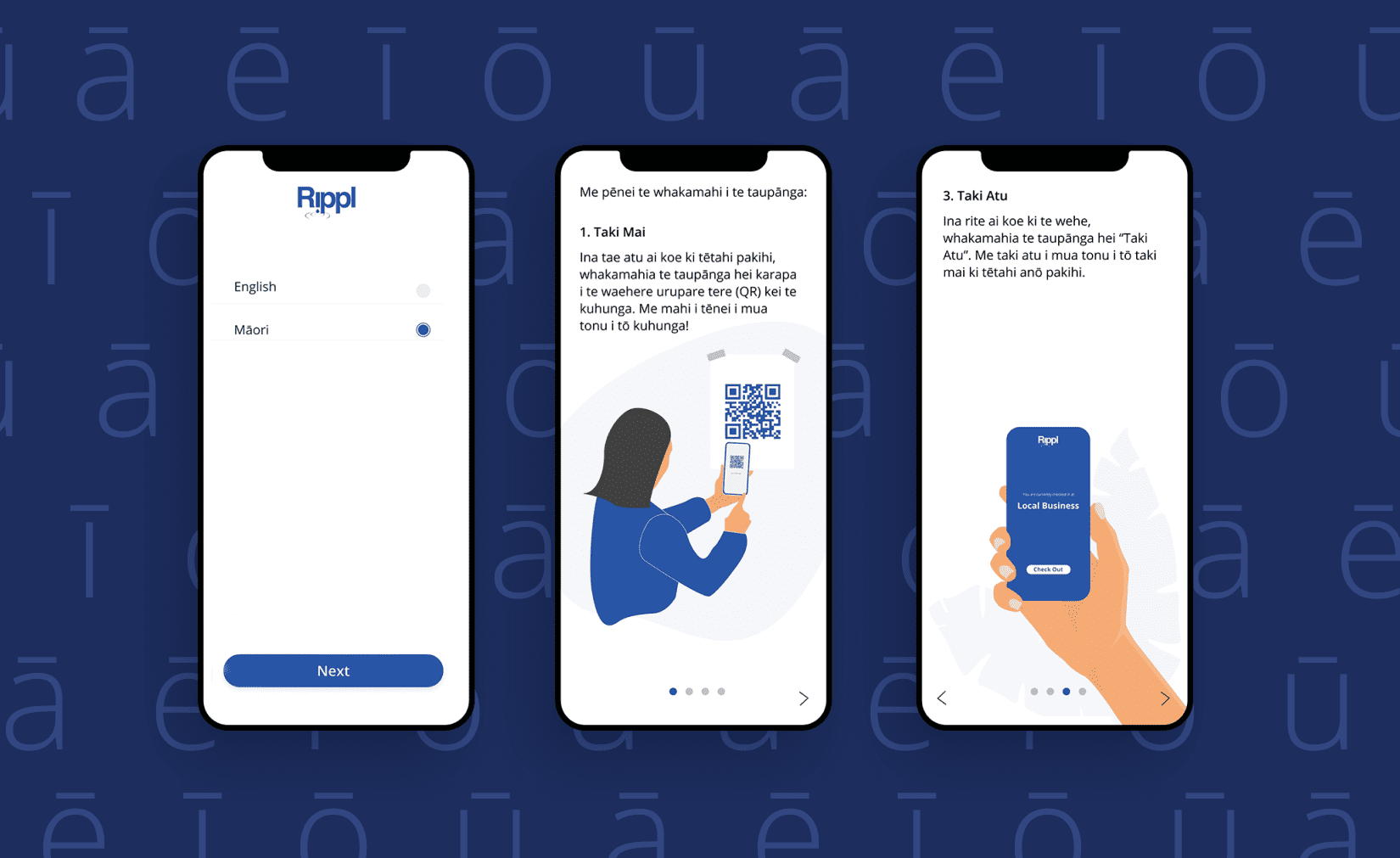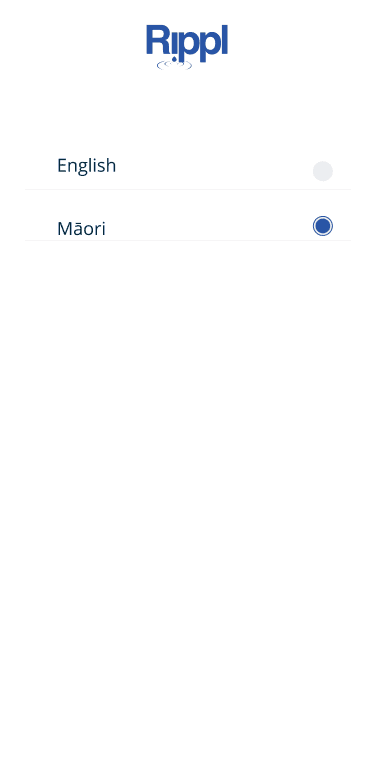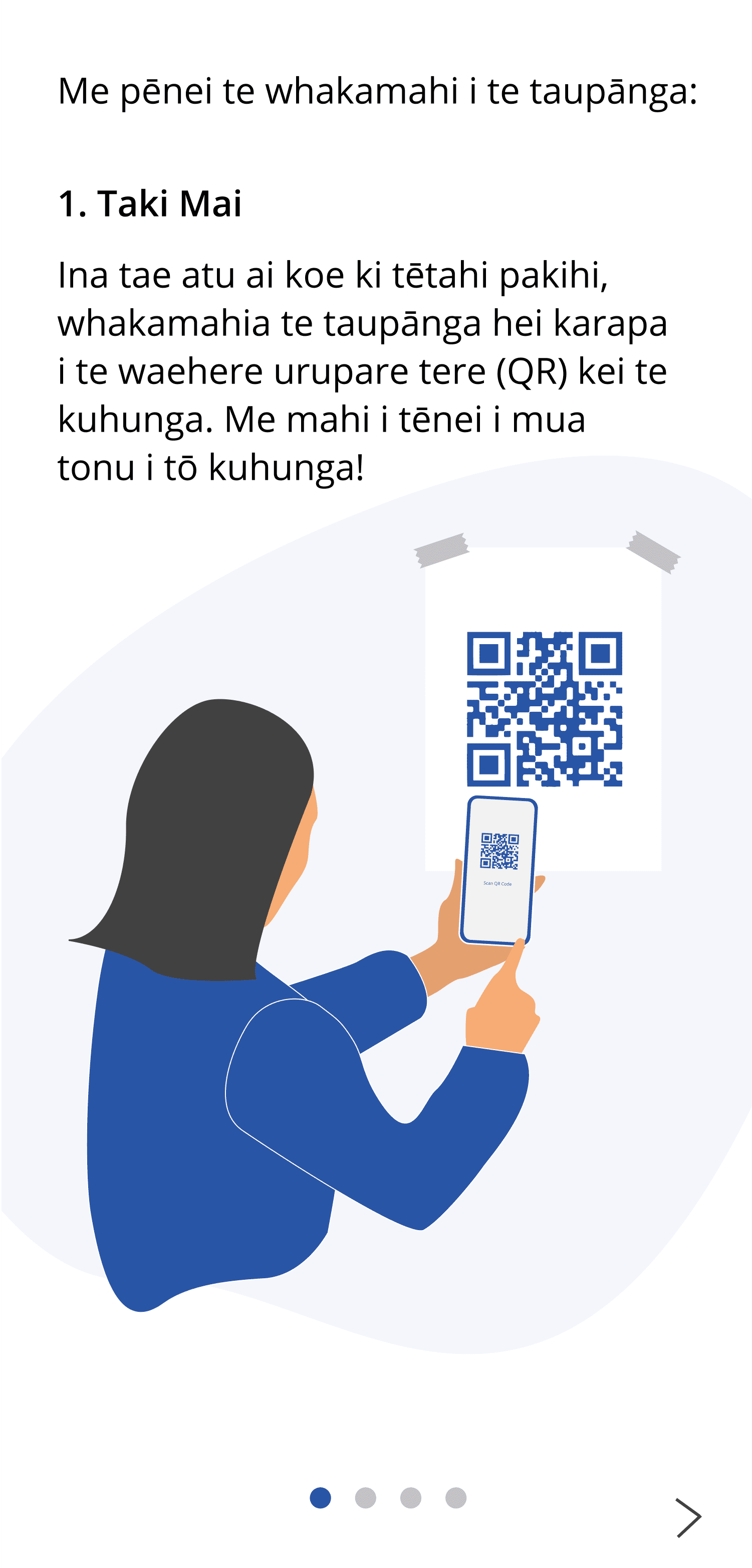
Earlier this year we developed a contact tracing app which included a te reo Māori option for key content. We received a lot of generous support as we designed and implemented the support for te reo, and we want to pay this forward by sharing what we learned. Rippl was conceived as a response to the NZ wide Covid-19 lockdown in March 2020 as there was an immediate need to develop a contact tracing solution for NZ businesses.
Our key motivation was to get local businesses back on their feet, and reassure the general public that a simple to use privacy-first contact tracing app was available. Business venues all over the country jumped on board very quickly, as Rippl enabled them to meet strict government requirements for reopening post-lockdown. Speed to market was key to our success too – within 3 weeks we took Rippl from concept to release.
Maximising Adoption
For a contact tracing app to be effective, it must be widely adopted by the general public. This was certainly top of mind for our team during the design stages of our app build. Our research showed that contact tracing apps in other countries had low rates of adoption due to privacy concerns, and the fear that applications could be used as surveillance tools. The first commitment we made throughout our app design process was that it was critical to the app’s nationwide acceptance to have a privacy-first approach, and to explain this in super clear language at every opportunity – including in the privacy policy in the app.
The second commitment we made was around inclusivity. It wasn’t good enough that people with English as their first language could understand that they could trust our app to protect their personal data and privacy, it also needed to be a solution that enabled as many people as possible to trust it. In Aotearoa, the obvious next step was to make key content available in te reo to include the Māori community. It was also important for us to use Rippl’s high profile to promote the importance of providing content in Māori generally.
I used to go retail and just browse. Can deal with hand sanitizer, just, but not entering anywhere now unless im already on their d’base or they use @Rippl_NZ. We’ve gone from “can I help you?” (bad) to “give me your info” (triplebad). Privacy and UX nightmare.
— Mark Cubey (@markcubey) May 19, 2020
Data as Taonga
I have previously outlined our approach of aligning with the Treaty of Waitangi/Te Tiriti and the Māori Ethics Guidelines for Data. In short, we’ve approached data as taonga, and taken steps towards aligning with Treaty guidelines around the use of Māori data.
We worked closely with Karaitiana Taiuru (author of the recently published “Treaty of Waitangi/Te Tiriti and Māori Ethics Guidelines for: AI, Algorithms, Data and IOT”) to better understand the Māori Ethics Guidelines, and what they meant for Rippl. Once we better understood the cultural and ethical areas we needed to address around data capture, it then led us to question how we might approach translating the app for greater inclusivity. One of Karaitiana’s key recommendations was to “ensure there is a full disclosure of how exactly all data is used in the app in plain language and making this information available in Māori and other languages.”
If you’re keen on understanding more about Māori data and Māori data sovereignty, Karaitiana has written a superb article on this – see the What is Māori Data section in particular.
Translating an app into Te Reo
With our deepened understanding of tikanga (Māori cultural values), we committed to translating the Rippl introduction content and Privacy Policy into Te Reo. To do this, we reached out to our Rippl partner, Wellington City Council to recommend a translator. Seeking recommendations for experienced translators that understand the type of content you’re trying to translate can really lift the quality of your end outcome.
When selecting a translator, we recommend checking that they are listed on the National Translators and Interpreters Register published by Te Taura Whiri i te Reo Māori (The Māori Language Commision). When working through your translator agreement, it is also a good idea to ensure that they offer quality assurance by way of a sense check by another qualified translator.
With Karaitiana’s guidance and encouragement throughout our data and translation journey, we also ensured that if the default language on a user’s phone was set to Māori then this was the default language selected in Rippl.
When a user chooses their language preference, the app gives them help pages and our Privacy Policy, to match their choice.
Chur @Rippl_NZ, I see you. And thank you for supporting reo Māori. #Tohutō #ReoMāori #LoveToSeeIt pic.twitter.com/NVE3QAKfFK
— torua (@torua16) August 12, 2020


With Rippl, we added Te Reo support for key areas of the application after our initial release of the app. If we had been under less time pressure to get the initial version out, we would have designed with dynamism and dual language from day one. Supporting multiple languages places similar design requirements on an app as dynamic text (for accessibility). In both cases, a design has to be able to flow and adapt to the text being displayed.
What next for the Rippl app?
Our next step is to add the already Māori translated Terms and Conditions to the Rippl app. We feel this will complete the ‘full disclosure’ obligations around making the app more inclusive for Kiwis.
In our capacity as an official Ministry of Health integration partner, we will be keeping the Rippl app available as an alternative to the NZCOVID Tracer App. It’s important to provide an alternative to people who don’t want to use the government issued app, so that we continue to make contact tracing as accessible as possible. By removing barriers to privacy and language we’re proud of the accessible, inclusive app we’ve developed for Kiwis.
Massive respect to the team @paperkiteltd @Rippl_NZ for leadership in innovation and putting privacy, people and usability first and for just being professional. Always behind you. Unite against Covid.
— Ntombi (@ntombixn) August 14, 2020
New digital project? Keen to optimise your existing digital project? We’re always keen to talk.
Made with ♡ in Wellington
© 2020 PaperKite